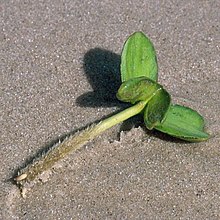propagule
Jump to navigation
Jump to search
English[edit]

Etymology[edit]
Noun[edit]
propagule (plural propagules)
- (biology) A reproductive particle released by an organism in order to propagate itself, by means such as dispersal or infection, to the next stage in its life cycle.
- 1989, Discovery and Innovation, Volumes 1-2, Academy Science Publishers, page 90,
- Propagule size could be one of these silvical characteristics.
- 1992, I. C. Tommerup, “2: Methods for the Study of the Population Biology of Vesicular-arbuscular Mycorhizal Fungi”, in J. R. Norris, D. J. Read, A. K. Varma, editors, Methods in Microbiology, Volume 24: Techniques for the Study of Mycorrhiza, Academic Press, page 27:
- In many combinations of fungi and soils more than one method of estimating propagules will need to be used to provide a valid test of propagule numbers.
- 2011, Committee on Assessing Numeric Limits for Living Organisms in Ballast Water, Assessing the Relationship Between Propagule Pressure and Invasion Risk in Ballast Water, National Research Council of the National Academies, National Academies Press, page 126,
- Combined with information on organism concentrations, this proxy could allow estimates of either total number of propagules per discharge or cumulative propagule supply over some temporal and spatial scale.
- 1989, Discovery and Innovation, Volumes 1-2, Academy Science Publishers, page 90,
Derived terms[edit]
Related terms[edit]
Translations[edit]
reproductive particle released by an organism to propagate itself
|
See also[edit]
Further reading[edit]
 Propagule pressure on Wikipedia.Wikipedia
Propagule pressure on Wikipedia.Wikipedia
French[edit]
Noun[edit]
propagule f (plural propagules)
Further reading[edit]
- “propagule”, in Trésor de la langue française informatisé [Digitized Treasury of the French Language], 2012.
